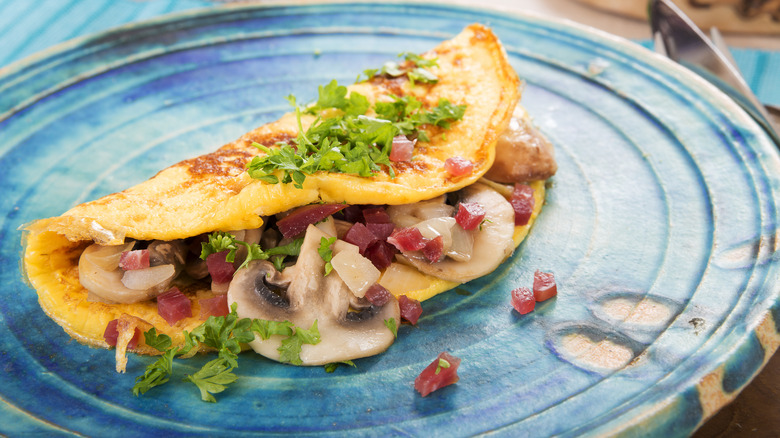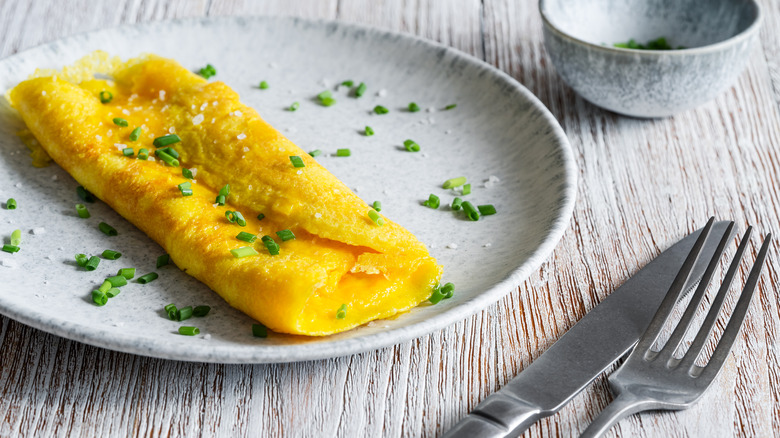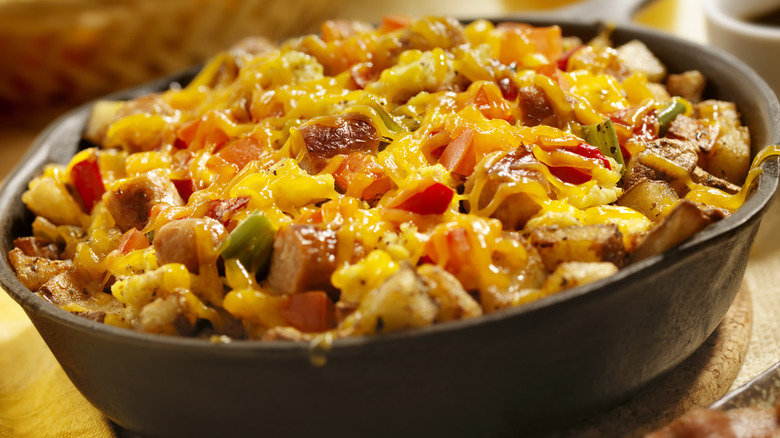Why Omelets Can Be A Risky Brunch Choice
We may receive a commission on purchases made from links.
Anyone who's ever been to brunch at a country club knows the omelet station is very popular and can easily back up. The result is usually some newbie in chef's whites hammering their way through pre-whisked or carton-mixed eggs, serving an omelet that's simultaneously overcooked (the eggs) and underdone (the litany of toppings shoved inside that haven't been fully sauteed, melted, or wilted).
Guests walk up, see all the toppings, and go ham like a child let loose in a candy shop: "I'd like bacon, tomatoes, peppers, onions, spinach, cheese, and ... mushrooms." Those onions and peppers are staying raw, that spinach isn't going to wilt, the cheese may melt eventually, and hopefully, you like mushrooms with a cardboard-like texture.
Additionally, many breakfast diners operate on a turn-and-burn basis, so there's no such thing as slow-cooked soft eggs. You get a hot pan, an egg patty, par-cooked fillings, and a line cook just trying to make it through service. These conditions aren't exactly conducive to bright, fluffy eggs. While there might not be anything inherently dangerous as far as food safety is concerned — though that may not be true for all brunch options; there's a reason Anthony Bourdain hated Hollandaise sauce, after all — the risk of ordering an omelet is leaving unsatisfied, hungry, and with a less-than-stellar opinion of a dish that's often a litmus test for whether someone knows how to cook.
Traditional omelets are simple yet complex
Chef Thomas Keller's fresh herb omelet recipe features six ingredients — five if you lump kosher salt with finishing salt — and very few, if any, can be found at your typical omelet station. The French Laundry founder emphasizes cooking eggs slowly to achieve that silken consistency and golden color.
There's no browning, no diced ham, and few fillers. It's just eggs, crème fraîche, herbs, salt, and butter. When done right, the finished product is an ode to the ingredients. However, that recipe contains more equipment than ingredients, and it's doubtful that Brad, the line cook at the local country club, is busting out an immersion blender and passing the mixture through a chinois before it hits the pan and goes in the oven.
Additionally, every foodie's favorite chef, Anthony Bourdain, proclaimed himself an "egg slut" in an 2009 episode of "No Reservations" (via YouTube). He never shied away from sharing his opinions on breakfast, especially regarding the omelet.
"I have long believed that it is only right and appropriate that before one sleeps with someone, one should be able — if called upon to do so — to make them a proper omelet in the morning," he wrote in his book, "Medium Raw." "Surely that kind of civility and selflessness would be both good manners and good for the world." By that logic, if proper omelets are good for the world, then subpar offerings are bad for the world.
An alternative to the omelet
Let's face it: The appeal of gargantuan omelets is to get your favorite breakfast fare wrapped inside eggs. It doesn't matter whether the onions and peppers are done, the spinach has a texture that sticks to your teeth, or if the eggs weren't cracked or whisked on-site — at least not at the restaurant where you're eating. You got to build your own, like at Subway, Pizza Hut, or Chipotle. That's not a bad thing if it's what you prefer. Food is subjective, and the quirks of diners are vast.
Having said that, you'll probably end up mashing everything together anyway after the fillings ooze out of your omelet like an overstuffed burrito. At that point, the omelet is more of a scramble, so why not make your life (and the cook's) easier and order a skillet? There are countless ways to order and prepare eggs, and if you want things cooked properly, or at all, try picking a method that matches the ingredients. There are skillets, scrambles, breakfast burritos (also wrapped!), quiches, frittatas, and other ways of cooking eggs with onions, peppers, mushrooms, bacon, etc., that allow all parties to shine.



